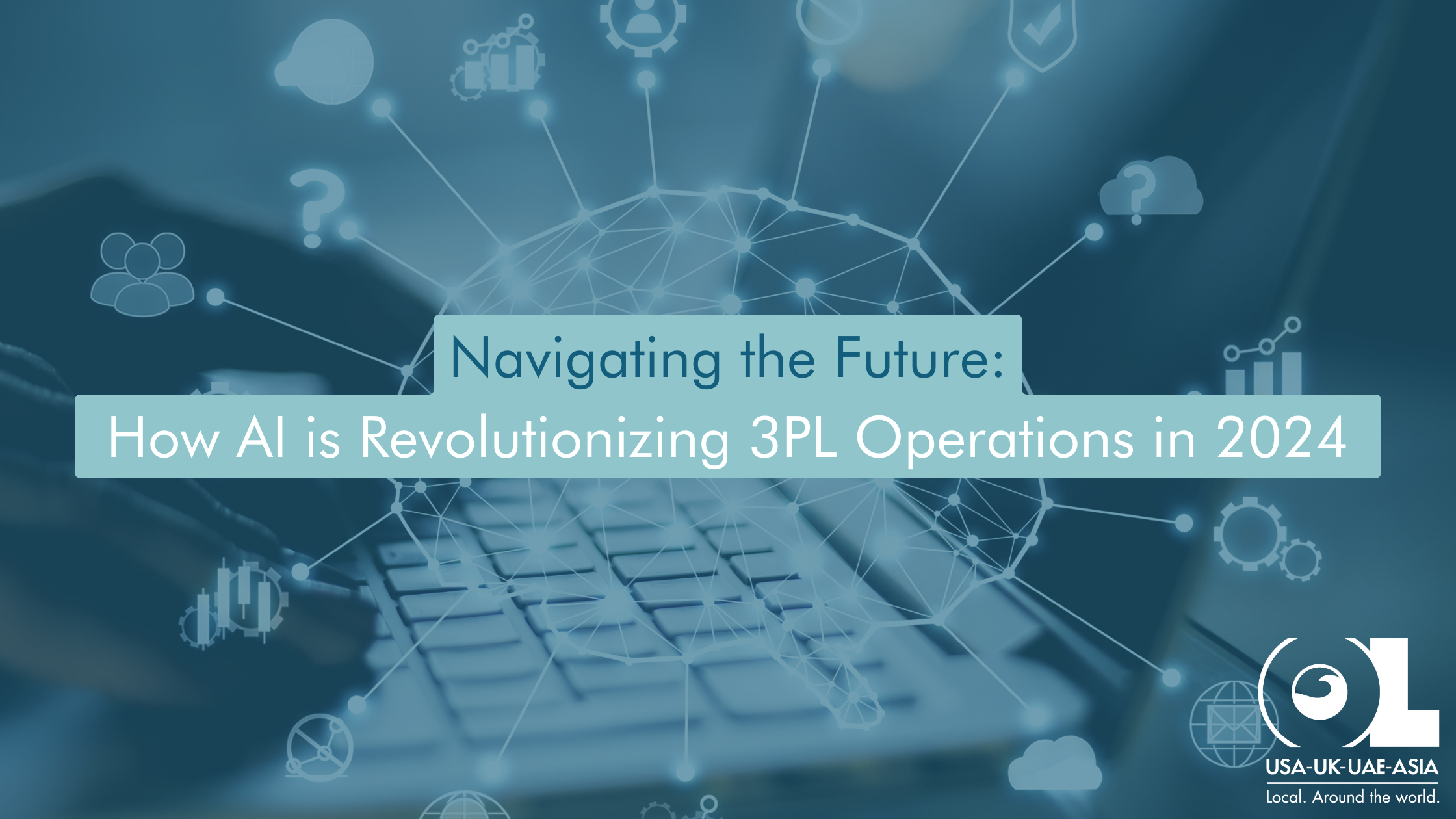In an era marked by unprecedented technological progress, the logistics industry finds itself at the forefront of transformative change. As supply chain dynamics continue to evolve, embracing innovative solutions has become more than just a strategic choice – it’s a necessity. In this fast-paced landscape, where precision and efficiency reign supreme, technological advancements stand as the driving force behind the optimization of logistics operations.
Enter the age of Artificial Intelligence (AI), a revolutionary force reshaping the very essence of 3PL operations. The significance of these technological strides extends far beyond mere upgrades; they signify a paradigm shift in how logistics providers navigate the complexities of modern supply chains. Today, we embark on a journey to unravel the transformative role of AI, exploring how it not only adapts to the demands of the industry but propels it into a new realm of efficiency and intelligence.
In an environment where speed and accuracy are paramount, logistics providers are compelled to harness the power of cutting-edge technologies to stay ahead. AI, with its ability to analyze vast datasets, predict trends, and automate decision-making processes, emerges as the linchpin in this evolution. The symbiotic relationship between AI and 3PL operations is not merely a trend – it’s a strategic alliance poised to redefine the standards of excellence in logistics management.
The Rise of AI in Logistics: Paving the Way for Tomorrow’s Supply Chains
In the ever-evolving landscape of logistics, the rise of Artificial Intelligence (AI) emerges as a pivotal chapter, rewriting the rules and elevating the industry to unprecedented heights. The integration of AI is not a mere technological advancement; it’s a strategic imperative that addresses the intricate challenges faced by logistics providers. Let’s delve into the core drivers propelling AI to the forefront of logistics innovation, reshaping the way we navigate the complexities of the supply chain.
Increased Efficiency:
At the heart of AI’s integration into logistics lies the pursuit of efficiency, a cornerstone in the quest for operational excellence. AI’s unparalleled ability to process vast datasets at lightning speed equips logistics providers with the tools needed to streamline processes, reduce bottlenecks, and enhance overall operational efficiency. From route optimization to warehouse management, AI acts as the catalyst that transforms manual, time-consuming tasks into seamless, automated workflows, allowing logistics professionals to allocate their expertise where it matters most.
Data-Driven Decision-Making:
In the realm of logistics, decisions carry significant weight, impacting everything from delivery timelines to inventory management. AI introduces a paradigm shift by infusing decision-making processes with data-driven insights. By analyzing historical and real-time data, AI empowers logistics providers to make informed, strategic decisions. This departure from traditional, gut-feel approaches ensures that every action is rooted in a comprehensive understanding of the intricate variables at play. It’s not just about moving goods; it’s about navigating the supply chain with precision and foresight.
Enhanced Predictive Capabilities:
AI’s prowess extends beyond the immediate present, venturing into the realm of predictive analytics. Through machine learning algorithms and predictive analytics, logistics providers gain the ability to foresee trends, anticipate demand fluctuations, and proactively address potential challenges. This foresight not only minimizes the impact of disruptions but also allows for proactive resource allocation, optimizing the supply chain for peak performance. In essence, AI transforms logistics from a reactive pursuit into a proactive, strategic endeavor.
Reshaping Traditional Supply Chain Models:
The infusion of AI technologies, particularly machine learning and predictive analytics, marks a departure from traditional supply chain models. Where conventional approaches relied on manual interventions and reactive measures, AI introduces a new era characterized by adaptability and agility. By continuously learning and adapting to evolving patterns, AI ensures that logistics operations remain resilient in the face of dynamic market conditions. This reshaping of supply chain models isn’t just a trend; it’s a fundamental shift that aligns logistics with the demands of the digital age.
Forecasting Demand with Precision:
AI’s predictive analytics capabilities transcend traditional forecasting methods, offering logistics providers a powerful tool to anticipate demand fluctuations. By analyzing historical data, market trends, and even external factors, AI models can generate remarkably accurate predictions. This not only aids in preventing overstock situations but also ensures that logistics providers are well-prepared to meet surges in demand, facilitating a more agile and responsive supply chain.
Optimizing Inventory Levels:
The marriage of AI and logistics extends to the very core of inventory management. Through predictive analytics, AI optimizes inventory levels, striking the delicate balance between meeting demand and minimizing excess stock. This not only enhances operational efficiency but also directly impacts the bottom line, as logistics providers can allocate resources with precision, reducing carrying costs and the risk of stockouts.
Real-World Success Stories:
Enterprises across industries are reaping the benefits of AI-powered predictive analytics in their 3PL partnerships. From global e-commerce giants fine-tuning their stocking strategies to manufacturers seamlessly adjusting production schedules, real-world examples showcase the transformative impact of predictive analytics. These success stories not only underscore the adaptability of AI but also serve as testaments to its tangible contributions to smarter logistics.
Autonomous Vehicles and AI in Last-Mile Delivery: Redefining Speed and Efficiency
In the race to perfect last-mile delivery, AI emerges as the driving force, propelling logistics into a new era of speed and efficiency. Explore with us as we unravel the seamless integration of AI with autonomous vehicles and route optimization algorithms, promising 3PL customers faster, more cost-effective delivery solutions.
The AI-Powered Last-Mile Revolution:
The marriage of AI and autonomous vehicles heralds a new age of precision in last-mile delivery. With real-time data analysis and route optimization algorithms, AI ensures that every delivery takes the most efficient path, reducing transit times and operational costs. This not only translates to tangible savings but also positions logistics providers as pioneers in the quest for sustainable, efficient delivery solutions.
Enhanced Delivery Solutions for 3PL Customers:
For 3PL customers, the benefits of AI in last-mile delivery are substantial. Expectations of faster deliveries, reduced costs, and enhanced overall efficiency become a reality as AI-powered technologies seamlessly integrate into logistics operations. From optimized routes to intelligent fleet management, the amalgamation of AI and last-mile delivery is not just a technological advancement – it’s a transformative leap toward customer-centric, agile logistics solutions.
Enhancing Supply Chain Visibility with AI: Illuminating the Path to Operational Excellence
In the complex tapestry of global supply chains, visibility reigns supreme, and AI emerges as the beacon illuminating the entire landscape in real-time. Join us as we unravel the critical role of AI in enhancing supply chain visibility, empowering 3PL customers to track shipments, manage inventory, and respond promptly to disruptions.
Real-Time Insight into the Supply Chain:
AI’s capacity for real-time data processing equips logistics providers with unparalleled visibility into every facet of the supply chain. From the moment a shipment leaves the warehouse to its final destination, AI ensures that each step is tracked, analyzed, and optimized. This level of visibility not only mitigates the risk of unforeseen disruptions but also allows for proactive decision-making, fostering resilience in the face of challenges.
In the dynamic tapestry of logistics, the infusion of Artificial Intelligence emerges as the catalyst for a profound transformation in 3PL operations. From predictive analytics forecasting demand to the integration of autonomous vehicles revolutionizing last-mile delivery, the chapters of this exploration paint a vivid picture of a logistics landscape reshaped by innovation. Real-world success stories underscore not just the promise but the tangible impact of AI in enhancing efficiency and responsiveness. As we embrace the boundless possibilities illuminated by AI, we stand at the threshold of a logistics future where adaptability, precision, and customer-centricity converge to redefine the very essence of 3PL operations in the evolving years to come.



